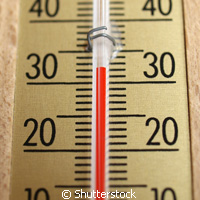EU experts: urgent action needed to curb climate change
Current emission reduction pledges are not enough to keep global temperatures from rising more than 2°C over industrial levels, EU experts have warned. They say that additional pledges are needed if the world is to avoid dangerous climate change. The experts deliver their stark warning in a document presented by the EU in the margins of the UN Climate Change Conference that is currently taking place in Cancun, Mexico. The report was drafted by climate change experts from across Europe at the request of EU Member States. At the last major climate change conference in Copenhagen, Denmark, in late 2009, countries agreed that global warming should be limited to 2°C; parties to the UN Framework Convention on Climate Change (UNFCCC) were invited to submit their emission reduction pledges for 2020. According to the researchers, an analysis of these pledges reveals that they are simply not enough to stabilise the climate. 'Even under the most optimistic assumptions and interpretations, the Copenhagen Accord pledges fall short of the 2020 reductions required for a likely chance of maintaining the 2°C limit,' the researchers explain. Describing the pledges as a 'step in the right direction', the experts emphasise that much more is needed, and quickly. 'The longer the delay in action, the more difficult it will become to limit global warming to less than 2°C,' they warn. The experts set out the actions they believe are needed to ensure a likely (i.e. greater than 66%) chance of meeting the 2°C target. According to them, a peak in emissions is required by around 2015; delaying this peak would require steeper annual reduction rates that would be more expensive to achieve and may even be unfeasible. Furthermore, by 2050, emissions must have declined by up to 70% compared to 1990 levels. Meanwhile countries must reduce emissions of long-lived greenhouse gases, such as carbon dioxide (CO2). It may be necessary to use technologies such as carbon capture and storage to limit CO2 emissions further, the researchers suggest. 'The achievement of the large reductions in anthropogenic greenhouse gases required to maintain the 2°C limit highly depends upon the implementation of effective policy instruments,' the experts conclude. 'This includes targeting as many emissions sources as possible with cost effective policies which are perceived as fair.' The researchers base their conclusions on a 66% chance of achieving the 2°C target. If countries desire a greater probability of meeting this ambitious target, even greater emissions reductions will be needed. Similarly, if a lower probability is considered acceptable, emissions reductions could be lower. However, the researchers warn: 'Even allowing 50% probability of limiting warming to below 2°C, the required post-2020 emission reduction rate may not be feasible.' The Copenhagen Accord also raises the possibility of setting a 1.5°C limit. Few studies have examined in detail the emissions scenarios needed to achieve such a target. However, even with extremely stringent mitigation activities, temperatures are likely to exceed 1.5°C for some time. Such a target would therefore probably be a long-term goal, with temperatures overshooting the limit for some time before coming back down. As the researchers point out, even a 2°C increase would have serious consequences. 'If an increase in global average temperature exceeds 2°C, it becomes less likely that the majority of human systems can adapt to climate change at globally-acceptable economic, social and economic costs,' the experts stress. 'In fact, by the time the global average temperature has reached 2°C, some regions are likely to have already experienced sizeable impacts on human activities and ecosystems.'
Countries
Belgium, Mexico



